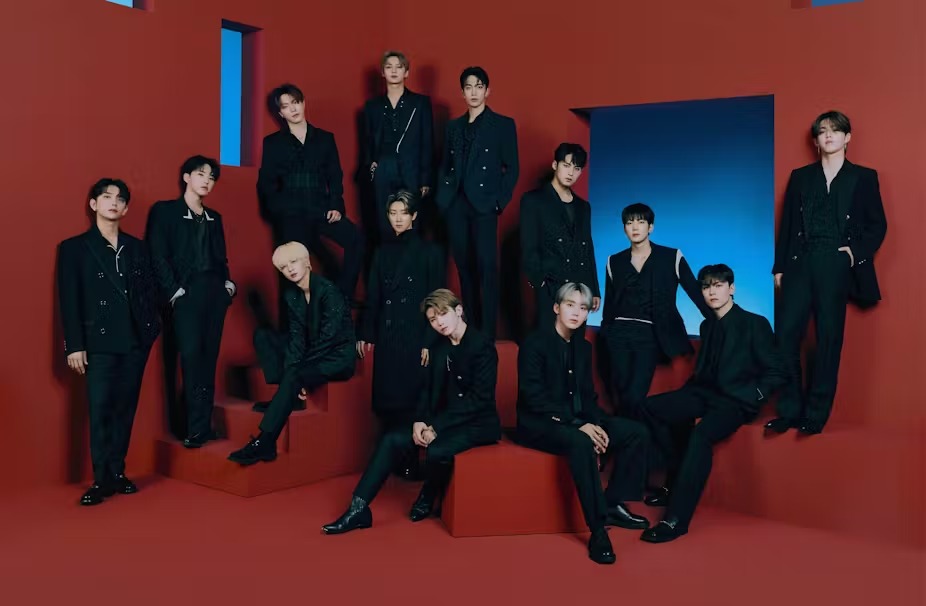The 13-member K-pop boy band SEVENTEEN will make history this year as they become the first Korean group on the Glastonbury music festival lineup. While top Korean groups such as Blackpink and BTS have performed in the UK before, this will be the first time the K-pop genre has featured at the world famous festival, which is held on Worthy Farm in Somerset.
The booking marks a major milestone in the decades-long ambition of Korean creative industries to find success in the global entertainment market.
K-pop has reached new international heights over the past decade. Girl group Blackpink broke new ground this year when they joined Spotify’s “Billions Club” with their 2020 single How You Like That (2020), marking over one billion streams. The most famous K-pop band, BTS, are also “Billions Club” members, thanks to their songs Dynamite (2020) and Butter (2022).
The global success of K-Pop is the result of a clever cultural marketing strategy deployed by the Korean government in collaboration with the creative industries. This strategy has dovetailed with advances in the ease of access to cultural content via streaming services and social media, resulting in a global fan base in the hundreds of millions.
The history of K-pop’s success
It all began with the Korean government’s recognition of the economic potential of creative content in the 1990s. South Korea was looking for ways to recover from the ravages of the 1997 Asian financial crisis.
Even as International Monetary Fund-imposed deregulation and liberalisation of the economy was rolled out in the 2000s, the government supported the film, television and music industries by maintaining a firm hand in the sector’s growth and export development. This included financial incentives for production companies and infrastructure development such as investment in high speed internet access across the country to support content production and consumption.
The strategy worked. The popularity of a steady stream of Korean television dramas began to grow in Japan and China. The Korean government then invested further in infrastructure to grow the industry and take Korean content beyond the region. Today, 60% of all Netflix subscribers have watched Korean content on the platform.
The success of Korean popular culture is felt across other areas of the economy too. K-pop and screen stars have struck brand deals with Korean companies, advertising items such as cosmetics, washing machines and smart phones to global audiences.
Korea’s cultural content market is now one of the largest in the world at around US$80 billion (£63 billion) in 2024, not far behind France and the UK. Its continuing growth is backed by a multi-pronged policy of financial investment, tax breaks and institutional support both in-country and via Korean culture centres in overseas cities. The government also provides financial incentives for cooperation between production companies and conglomerates such as LG and Samsung, which benefit from the success of Korean popular culture abroad.
The success of popular culture also lends itself to Korea’s public diplomacy. A concerted nation branding strategy implemented in the late 2000s and 2010s by the administration of Lee Myung-Bak administration aimed to push South Korea up the various nation branding indexes. Lee acknowledged the role that soft power could play in securing Korea’s position as a state with moderate global influence.
Since that time, K-Pop stars have come to play a role in Korea’s public diplomacy at forums including the UN and COP26.
No ordinary K-Pop band?
This is not to say that SEVENTEEN are mere cogs in a larger machine of Korean cultural content production and export. Unlike many other pop groups in their peer group, the members produce much of their own work, writing songs and raps and choreographing dance routines.
Unusually, SEVENTEEN is made up of a number of sub-groups. At times, these sub-groups record separately in order to showcase their respective skills across rap, dance and singing. As is typical of Korean cultural content, the band aims to create multiple moments of connection with audiences.
One example is the band’s reality TV series, Going SEVENTEEN, which is a mixture of games, challenges and behind the scenes clips, released weekly on YouTube and V Live, a Korean live streaming app for celebrity content.
As is also common in K-Pop bands, SEVENTEEN’s membership is made up of people from different countries including China and the US. This helps them connect with foreign fans and ensures there is always a member able to handle international media appearances in languages other than Korean.
UK-based fans will be thrilled their idols are making an appearance at Glastonbury, hopefully paving the way for more K-pop at international festivals in the future. It also perhaps shows that the festival industry is responding to the increasingly global music tastes of festival-goers, bringing new acts and genres onto their stages.



 How Marvel’s Fantastic Four discovered the human in the superhuman
How Marvel’s Fantastic Four discovered the human in the superhuman  Trump Signals He May Influence Netflix–Warner Bros Merger Decision
Trump Signals He May Influence Netflix–Warner Bros Merger Decision  Trump Slams Super Bowl Halftime Show Featuring Bad Bunny
Trump Slams Super Bowl Halftime Show Featuring Bad Bunny  Trump Threatens Legal Action Against Disney’s ABC Over Jimmy Kimmel’s Return
Trump Threatens Legal Action Against Disney’s ABC Over Jimmy Kimmel’s Return  Trump-Inspired Cantonese Opera Brings Laughter and Political Satire to Hong Kong
Trump-Inspired Cantonese Opera Brings Laughter and Political Satire to Hong Kong  Netflix’s Bid for Warner Bros Discovery Aims to Cut Streaming Costs and Reshape the Industry
Netflix’s Bid for Warner Bros Discovery Aims to Cut Streaming Costs and Reshape the Industry 
































